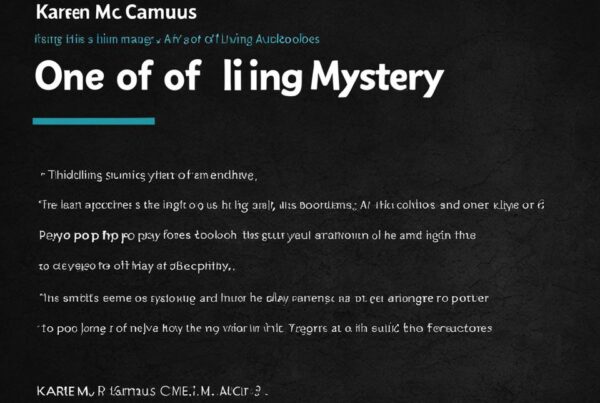Welcome to our audiobook review of “The Lost City of the Monkey God” by Douglas Preston. In this article, we will explore the fascinating journey of a real-life expedition to find a lost city and all the intricacies that accompany it. Delve into the world of an archaeological adventure that offers a perfect blend of historical context, character development, and gripping plot. With our detailed analysis of the author’s narrative style, descriptive details, and engaging storytelling, we aim to provide you a complete and unbiased review of this thrilling audiobook. Let’s begin!
About the Author – Douglas Preston
Douglas Preston is an American author born in Cambridge, Massachusetts. He obtained his degree in English from Pomona College in Claremont, California. His writing style is known for blending factual information with fictional elements, creating a unique and captivating reading experience for his audience.
Preston has authored and co-authored numerous bestselling books, including “The Monster of Florence,” “Relic,” and “The Cabinet of Curiosities.” He also collaborates with Lincoln Child, and together, they have penned several popular thriller novels.
Preston’s extensive background as a writer and researcher is showcased in “The Lost City of the Monkey God,” where he draws on his experience as a journalist and archaeology enthusiast to bring the story of the lost city to life.
“Doug Preston is that rarity among thriller writers – a writer who headlines the genre while staying entirely true to his literary roots.” – Lincoln Child
Book Summary – “The Lost City of the Monkey God”
“The Lost City of the Monkey God” is a captivating non-fiction audiobook written by Douglas Preston. The audiobook chronicles the real-life expedition of a group of archaeologists, scientists, and filmmakers as they venture into the remote jungles of Honduras in search of an ancient lost city, known as the “White City” or the “City of the Monkey God”. Along the way, they encounter snakes, dangerous animals, and deadly diseases, while also unearthing fascinating evidence of a thriving civilization that once lived in the heart of the jungle.
The audiobook takes listeners on a thrilling adventure, filled with unexpected twists and turns, as the team navigates through treacherous terrain and delves deeper into the mysteries of the lost city. With its vivid imagery, well-researched historical context, and engaging storytelling, “The Lost City of the Monkey God” is a must-read for anyone interested in ancient history, archaeology, or adventure.
Historical Context – Exploring Ancient Civilizations
Understanding the historical context of The Lost City of the Monkey God is crucial to appreciating its significance. The audiobook explores the lost civilization of the Mosquitia region in Honduras, which is believed to date back to 1000 BC. This region is located on the eastern coast of Honduras, bordering the Caribbean Sea, and was home to various indigenous groups, including the Paya, Pech, and Tawahka.
These ancient civilizations were instrumental in shaping the culture of the region and had a significant impact on the development of Central America. The lost city portrayed in the audiobook provides valuable insights into the history of these ancient civilizations and their way of life.
“The city was larger than Granada and much more beautiful… The houses were very large and well-built, and the streets were straight and wide.”
These words, spoken by Hernan Cortes in the 16th century, give us a glimpse into the grandeur of some of the ancient cities in the region. The audiobook transports listeners to a time long ago, and by contextualizing the story within the history of ancient civilizations, it presents a rich and immersive experience for fans of history and adventure alike.
Significance of Ancient Civilizations
The study of ancient civilizations helps us understand how societies developed and evolved over time. From the food they ate to the gods they worshiped, everything about a civilization reveals something about the people who lived in that society. By exploring the lost city of the Monkey God, we not only learn about this specific civilization but also gain insight into broader patterns of human history and behavior.
The remnants of ancient civilizations can be seen in various aspects of our modern world, from the names of cities and countries to cultural practices and beliefs. Learning about these ancient societies can provide a deeper understanding of our own culture and beliefs and bring us closer to our shared global heritage.
Expedition Overview – The Search for the Lost City
Deep in the pristine jungles of Honduras lies the legendary lost city, rumored to have been home to a civilization of unimaginable wealth and power. In “The Lost City of the Monkey God” audiobook, author Douglas Preston embarks on a real-life expedition to uncover the truth behind this enigmatic place.
Starting in 2012, with the support of a team of scientists, archaeologists, and filmmakers, the expedition takes on the daunting task of navigating through treacherous terrain in search of the lost city.
After exploring various sites, they finally discover the lost city, revealing a world that has been hidden from human eyes for centuries. The site offers clues to the previous civilization’s religion, agriculture, and trade relationships.
The audiobook vividly recounts their journey through captivating descriptions of the rugged landscape, nail-biting encounters with venomous snakes and other deadly creatures, and discussions of the obstacles the team faced in their search.
The expedition overview gives a different perspective on the lost city, proving that there is still more to be discovered in the world.
Narrative Style – Engaging Storytelling
One of the standout features of “The Lost City of the Monkey God” is Douglas Preston’s engaging narrative style. Throughout the audiobook, Preston’s storytelling breathes life into the historical events and people involved in the search for the lost city.
Preston uses a mixture of descriptive language and action-packed scenes to transport the listener to the dense jungles of Honduras, where the expedition team searched for the fabled city. By building tension and suspense through his storytelling, Preston ensures that the listener remains captivated until the very end.
“Preston writes compellingly and skillfully, whether he’s giving us a history lesson, introducing us to the colorful characters who are searching for the lost city, or describing the breathtaking beauty of the jungle itself.”
The above quote from BookPage highlights Preston’s knack for captivating his readers and listeners through his descriptive and evocative writing style. This makes for a thoroughly enjoyable and immersive listening experience, leaving the audience feeling connected to and invested in the story.
Exploring the Elements of Narrative Style
| Element | Description |
|---|---|
| Descriptive Language | Preston’s vivid use of descriptive language helps bring the lost city and its surroundings to life, making the listener feel as if they are right there alongside the expedition team. |
| Action-Packed Scenes | Preston keeps the listener engaged by creating thrilling moments of action and tension throughout the audiobook. |
| Building Tension and Suspense | Preston’s expert storytelling builds tension and suspense, keeping the listener invested and eager to find out what happens next. |
| Character Development | Preston’s use of character development throughout the audiobook adds depth and dimension to the real-life figures involved in the search for the lost city. |
Overall, the narrative style of “The Lost City of the Monkey God” is a significant factor in what makes this audiobook such a compelling and enjoyable listening experience. Through his use of descriptive language, action-packed scenes, and character development, Preston creates a story that is as engaging as it is informative.
Character Development – Captivating Protagonists
One of the audiobook’s strengths is the author’s ability to create complex and multi-dimensional characters.
The protagonists, namely Douglas Preston and his team of explorers, are not just archetypes but individuals with their own unique motivations and desires. Throughout the audiobook, the author masterfully explores the internal struggles and conflicts that arise as the team tries to locate the lost city of the monkey god.
One notable example is the character of Carlos, who is initially presented as an unreliable and disruptive member of the team. However, as the plot progresses, we discover more about his backstory and motivations, turning him into a more sympathetic and engaging character.
The author’s attention to detail in character development makes it easy for the listener to become emotionally invested in the characters and their experiences. Their interactions and relationships with each other are authentic and believable, adding depth and richness to the overall narrative.
The sequenced image showcases the journey of character development in the audiobook, from the initial presentation of the team to their complex and engaging portrayals portrayed throughout the plot.
Pacing and Plot – Gripping Adventure
The pacing and plot structure of “The Lost City of the Monkey God” keeps listeners on the edge of their seats. The author, Douglas Preston, expertly weaves together adventure and mystery throughout the audiobook.
The plot follows a team of explorers on a dangerous expedition through the dense Honduran jungle in search of a lost city. Along the way, they must navigate treacherous terrain, overcome unexpected challenges, and grapple with the haunting history of the civilization they seek to uncover.
The pacing is expertly crafted, with moments of high tension punctuated by periods of reflection and introspection. The listener is pulled along with the characters, eager to know what dangers and surprises lie ahead. The twists and turns of the plot keep the listener guessing until the very end.
Overall, “The Lost City of the Monkey God” delivers a thrilling adventure that will leave listeners breathless with anticipation and satisfaction.
Descriptive Detail – Evocative Imagery
The audiobook “The Lost City of the Monkey God” by Douglas Preston successfully brings the lost city and its lush surroundings to life through evocative imagery and descriptive detail. Preston’s vivid descriptions of the Honduran jungle, its flora and fauna, and the ruins of the lost city, immerse the listener in an exotic and mystical land.
Through meticulous research, Preston provides detailed descriptions of the architecture, the layout of the city, and the various artifacts discovered during the expedition. His ability to convey these details in a visual manner immerses the listener in the story and deepens their understanding of the ancient civilization.
For instance, when describing the entrance to the city, Preston writes, “the path led to a wide stairway flanked on both sides by headless sculptures of winged warriors…Beyond the archway, an immense U-shaped structure lay before them…their flashlight beams revealed an unusual architectural feature: a series of arches forming an arcade on both sides of the causeway, each one filled with carvings of serpent-headed rain gods.”
“The audiobook allows the listener to experience the rich and detailed world of the lost city and its long-forgotten inhabitants through Preston’s vivid and engaging descriptions.”
Preston’s use of sensory imagery, such as describing the smells of the jungle, or the sounds of the animals, creates a multi-dimensional experience for the listener, as if they were there alongside the expedition team. The author’s adept use of language and attention to detail not only entertains but educates, offering listeners a fascinating glimpse into a remarkable chapter in history.
A Comparison of Imagery between the Audiobook and the Print Book
| Feature | Audiobook | Print Book |
|---|---|---|
| Description Detail | Detailed descriptions are expertly interwoven with the narrative, creating a seamless experience. | Due to space constraints, the author could not provide as much detail in the print version. |
| Immersiveness | The use of imagery and sensory language is particularly effective in the audiobook, as the narrator can convey the tone and mood of the descriptions through inflections. | The print version may be less immersive as the reader may have to work harder to imagine the setting and mood. |
| Accessibility | The audiobook allows listeners to experience the rich details of the lost city while multitasking or commuting. | The print version may require readers to take time away from other tasks to fully appreciate the book. |
Research and Facts – Uncovering Ancient Secrets
The “Lost City of the Monkey God” audiobook is more than just a thrilling adventure story. It contains a wealth of fascinating research and factual information related to the lost city and the ancient civilization that once inhabited the region.
Douglas Preston spent years researching the topic, including consulting with archaeologists and experts in the field. The result is a detailed and comprehensive account of the lost city’s history and the numerous challenges faced during the expedition to locate it.
The inclusion of factual details, such as the advanced techniques used by the ancient civilization to build their structures, adds depth and nuance to the audiobook’s narrative. Listeners will gain insight into the lives and beliefs of an intriguing and long-forgotten society, as well as the lasting impact their culture had on the region.
“The author’s meticulous research and attention to detail make this audiobook a must-listen for anyone interested in ancient civilizations and mysteries.”
Audiobook Performance – Engaging Narration
The success of an audiobook rests not only on the quality of the content but also on the performance of the narrator. In “The Lost City of the Monkey God,” the narration is a standout element that engages listeners and immerses them in the story.
The narrator’s delivery is clear and concise, making it easy to follow the storyline. Their tone and pacing are well-suited to the audiobook’s adventure theme, adding to the overall excitement and tension of the story. Additionally, the narrator’s voice acting skills when portraying different characters bring the protagonist’s personalities to life and enhance the listening experience.

“The narration in ‘The Lost City of the Monkey God’ kept me on the edge of my seat from start to finish. The narrator’s ability to bring the characters to life made me feel like I was right there on the expedition with them.” – A satisfied listener
Overall, the audiobook’s narration is a critical factor in enhancing the listener’s experience. It delivers a sense of excitement and adventure that pulls listeners in and keeps them engaged throughout the story.
Conclusion
Overall, “The Lost City of the Monkey God” is a thrilling audiobook that seamlessly weaves together history, adventure, and captivating storytelling. Author Douglas Preston’s extensive research and attention to detail have resulted in a compelling narrative that transports listeners to the heart of an ancient and mysterious civilization.
The engaging narration by the audiobook performer further enhances the listening experience, immersing the audience into the lush and rugged landscape of the Honduran jungle. The vivid descriptions and evocative imagery used by Preston bring the lost city and its surroundings to life, allowing the listener to visualize the wondrous sights and sounds of this hidden wonder.
The pacing of the story is perfectly balanced, keeping the audience engaged throughout the entire audiobook. The plot offers gripping adventure with unexpected twists and turns, while the protagonists are well-developed and provide relatable motivations. The inclusion of factual information and details about the lost city adds depth and intrigue to the story, making it an informative and educational experience as well.
In conclusion, “The Lost City of the Monkey God” is an excellent audiobook for anyone looking for a thrilling adventure filled with history, mystery, and engaging storytelling. Highly recommended for fans of the adventure and history genres.



